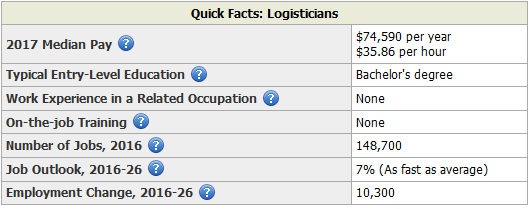
Careers in Logistics and Supply Chain Management (SCM)
Workers in the logistics and supply chain management (SCM) field make sure that goods and services get into the hands of consumers. The logistics industry is an important driver of economic growth and development.
All types of businesses, big and small, need logistics managers to help with inventory and accounts receivable. A small business may have one person in charge of these duties, while large corporations have entire logistics and supply chain departments. Learn more about this career and several others with the links below:
- What Qualifications Do I Need For A Career In Logistics And SCM?
- What Entry-Level Careers Are There In Logistics And SCM?
- What Advanced Roles Are There In Logistics And SCM?
- What Is the Career Outlook In Logistics And SCM?
What Qualifications Do I Need For A Career In Logistics And SCM?
To work in the logistics field, you’ll likely need a bachelor’s degree. Some employers may require a professional or master’s degree, depending on the position and level of responsibility.
Most degree programs offer internship opportunities, which is a great way to get first-hand experience in the field. There are degree programs in logistics and supply chain management, or you can earn a degree in business with a concentration in logistics and supply chain management. Both are beneficial to students interested in working in this field.
After considering your options, it will be time to choose which degree path you want to take. The good news is that you have several options, and your academic and career goals will help you decide the appropriate next step.
If you’re not sure which degree path to take, we’ve created a helpful inventory of programs at all education levels:
Associates
- Associates In Logistics/Supply Chain Management Programs: An associate’s degree program in logistics prepares students for entry-level careers in purchasing, inventory control, distribution, and more. Coursework provides students with a solid foundation in the various sectors of the logistics field.
Bachelors
- Bachelors In Logistics/Supply Chain Management Programs: A bachelor’s degree program in logistics/supply chain management focuses on areas of global supply chain management, transportation, logistics, warehouse operations, demand planning and forecasting, inventory management, and manufacturing and procurement processes.
- Bachelors In Project Management Programs: A bachelor’s degree program in project management focuses on the tools and techniques of effective project management, including leadership skills, planning and organizational tools, scheduling, procurement, contracts, and risk management.
- Bachelors In Operations Management Programs: A bachelor’s degree program in operations management provides students with the tools needed for success as a manager, including organization, motivation and hiring skills, as well as resource development.
Masters
- Masters In Logistics/Supply Chain Management Programs: A master’s degree program in logistics and supply chain management prepares students for management positions in government, military, and the private sector.
- Masters In Project Management Programs: A master’s degree program in project management is designed to prepare graduates for leadership roles in the construction, operations, and management of major civil and environmental engineering projects.
- MBA In Project Management Programs: MBA programs in project management provide a comprehensive business education to help develop students’ management expertise and advance their knowledge and skills in areas such as corporate management.
- Masters In Operations Management Programs: A master’s degree program in operations management prepares students for advanced leadership roles in global business and technical environments.
- Masters In Industrial Engineering Programs: A master’s degree program in industrial engineering helps students develop the skills needed to optimize manufacturing operations and supervise high-tech production processes.
Doctoral
- DBA In Logistics/Supply Chain Management Programs: A DBA in logistics/supply chain management program helps prepare students to pursue an academic career or to become a professional researcher analyzing logistics and supply chain management.
- PhD In Project Management Programs: A PhD in project management program is designed to support the growing need for workers with the skills necessary for successful academic, research, teaching, training, and consulting careers.
Certificates
- Certificates In Logistics & Related Fields: Certificate programs are designed to give students mastery over a subject area or topic and are relatively short-term, 3-9 months. Undergraduate certificates are for those with a high school diploma or GED, and graduate certificates are for students with a bachelor’s degree.
Business law, accounting, economics, and statistics courses are common to supplement the more specified logistics material. A logistics manager will need to be familiar with various software programs, as that is the most common way to keep track of product movement. The majority of logisticians work in manufacturing, for the government, or with other opportunities in scientific and technological fields, transportation, or aerospace.
Another avenue to consider is online education. Many schools now offer online logistics degree programs at all education levels. Distance education allows you to schedule your classes around work and other commitments.
What Entry-Level Careers Are There In Logistics And SCM?
One of the most common entry-level positions in this field is customer service management. Customer service is an important part of logistics and supply chain management on an individual level, since listening to and helping your consumers is the backbone of any business. You can also manage product inventory for a business, plan and oversee product transportation needs, and manage supplies needed for manufacturing.
You are not limited to customer service management, however. You can also find entry-level employment working as a distribution clerk, van driver, operations clerk, and many other jobs that provide a stepping stone to more advanced positions.
Some entry-level jobs do require at least a bachelor’s degree such as operations research analyst or process associate. These jobs are more focused on critical and analytical thinking, and may require various certifications to prove your expertise in the field.
What Advanced Roles Are There In Logistics And SCM?
As you gain experience in logistics and supply chain management, you’ll be able to take on advanced roles in this field. You could work as an industry analyst, project manager, global logistics manager, operations director, transportation director, or international logistics manager, just to name a few positions open in this field.
A logistical manager (or logistician) directs the efficient movement of a product or service from the supplier to the consumer. The logistician is in charge from the very beginning of product acquisition to the very end of secure delivery. Similarly, a supply chain manager examines procedures for opportunities to streamline existing conditions.
Overall, both positions direct the movement, storage, and processing of inventory. For those who attain more experience, upper management positions such as presidents and vice presidents are highly sought after. These top-level positions oversee all aspects of logistics and supply chain management, and usually come attached with a six-figure salary.
If you’re interested in working abroad or with an international customer base, advanced jobs in logistics often provide such opportunities. In our ever-increasingly globalized world, many logistics companies work with foreign distributors to conduct business.
You can also work as a consultant, which provides opportunities to interact with a variety of companies, both nationally and abroad. As a consultant, you’ll offer tips and strategies on how to streamline processes. After learning the basics of logistics, becoming a consultant might be an option worth considering if you prefer a more flexible schedule and the ability to work with a variety of clients and businesses.
Careers in logistics are as diverse as the field itself. We’ve outlined a few of the various career options below:
- General Management: General management is a versatile field focusing on high level leadership as well as connecting the moving parts of a major organization together. The scope of positions within general management can vary greatly but are almost always focused on day-to-day operations and managing several teams working together.
- Operations Management: The field of operations management is aptly focused on production and business operations. Specialists analyze, control, and create systems and processes involved in the output of goods and services.
- Project Management: Project managers oversee and control company resources to achieve common goals in an effective, time-efficient manner. These managers work with employees and teams to motivate and organize them to accomplish the tasks at hand.
- Small Business Management: Successful small business owners are often required to manage the flow of goods and/or services through the supply chain. A degree in logistics can prepare you to manage these supply chain processes and the people who work in them.
Students typically go on to work in logistics and supply management for a company, although the managerial and leadership skills acquired when studying for a logistics degree can be applied to management or supervising job positions in many fields.
Some schools offer a degree in transportation and logistics. This degree revolves around logistics and transporting major volumes of waste or chemicals. In this case, you are learning to transport these materials and the most effective way to dispose of them. In this program, you take courses such as hazardous material transportation, logistics and management operations, international logistics management, and air transportation. This is a growing field that is set to expand globally.
What Is the Career Outlook In Logistics And SCM?
With globalization making even the furthest reaches of our world more and more connected, now is a great time to be looking into the field of logistics. According to The Bureau of Labor Statistics, employment in the field is projected to grow 7 percent from 2016 to 2026, about as fast as the average for all occupations. Employment growth will be driven by the need for logistics in the transportation of goods in a global economy.
The annual wage for logisticians was $74,590 in May 2017. Jobs in the field of logistics and supply chain management include logistics manager, integrated programs director, supply chain director, inventory manager, supply chain planning manager, and other specified careers. Below is a quick-facts chart that summarizes the job outlook and current pay scale for logisticians (source: BLS.gov: Occupational Employment And Wages: Logisticians, data for May 2017).

Most companies prefer logistic managers to have at least a bachelor’s degree in fields of business, industrial engineering, or supply chain management. Likewise, one can show their dedication in the field by acquiring certification from APICS or the International Society of Logistics (SOLE).
Additionally, having both a degree and work experience will help in finding a job. As many jobs in the field are related to the government and military, having a military background can be beneficial as well.
